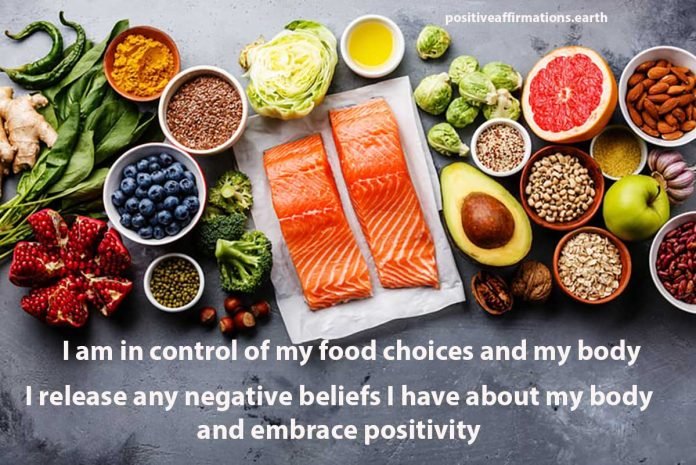Healthy eating and positive body image are vital components of overall wellness. However, it can be challenging to achieve a positive relationship with food and our bodies, particularly in a culture that values thinness and perpetuates negative body image beliefs. Fortunately, taking control of our food choices and releasing negative beliefs about our bodies can help us develop a healthier relationship with food and our bodies. This article will explore the importance of taking control of our food choices and embracing positivity in relation to our bodies.
Positive Affirmation: I am in control of my food choices and my body:
Taking control of our food choices means making informed decisions about what we eat and why we eat it. It involves being mindful of the foods we choose to nourish our bodies and recognizing the impact that our choices can have on our physical and mental health. When we are in control of our food choices, we are empowered to make choices that serve our overall health and well-being.
There are several strategies we can use to take control of our food choices. One approach is to practice mindful eating. Mindful eating involves paying attention to the sensory aspects of our food, such as its taste, texture, and aroma. It also involves paying attention to our hunger and fullness cues and making choices based on our body’s needs rather than external cues such as advertising or social pressure.
Another strategy for taking control of our food choices is to prioritize whole, nutrient-dense foods. Whole foods, such as fruits, vegetables, whole grains, and lean protein sources, provide essential vitamins, minerals, and fiber that our bodies need to function optimally. By choosing whole foods over processed and highly refined foods, we can nourish our bodies and support our overall health.
Taking control of our food choices also involves being mindful of portion sizes. Portion sizes have increased significantly in recent years, contributing to the obesity epidemic. By being aware of appropriate portion sizes and avoiding oversized servings, we can help prevent overeating and support a healthy weight.
Positive Affirmation: I release any negative beliefs I have about my body and embrace positivity
Negative body image beliefs can have a significant impact on our mental health, leading to anxiety, depression, and disordered eating behaviors. It is essential to release these negative beliefs and embrace positivity to promote a healthier relationship with our bodies.
Releasing negative body image beliefs involves challenging and changing negative thought patterns. When we have negative beliefs about our bodies, we tend to focus on perceived flaws and compare ourselves to unrealistic beauty standards. To release these negative beliefs, we can practice positive self-talk and focus on our strengths and abilities rather than our appearance.
Practicing self-compassion is another strategy for releasing negative body image beliefs. Self-compassion involves treating ourselves with kindness, understanding, and acceptance, rather than self-criticism and judgment. When we practice self-compassion, we acknowledge our imperfections and recognize that everyone has flaws. This can help us develop a more positive relationship with our bodies and promote overall well-being.
Embracing positivity also involves surrounding ourselves with positive messages and influences. This can involve seeking out positive role models, such as individuals who promote body positivity and self-love. It can also involve being mindful of the media we consume, avoiding sources that perpetuate negative body image beliefs and unrealistic beauty standards.
Conclusion:
Taking control of our food choices and embracing positivity in relation to our bodies are essential components of overall wellness. By being mindful of our food choices and choosing whole, nutrient-dense foods, we can nourish our bodies and support our physical and mental health. Releasing negative body image beliefs and practicing self-compassion and positive self-talk can help us develop a healthier relationship with our bodies and promote overall well-being.
References:
- Tylka, T. L., Annunziato, R. A., Burgard, D., Calogero, R. M., & Tylka, T. L. (2014). ‘True’ selves: Understanding trans people’s body image experiences. Journal of Counseling Psychology, 61(1), 33-42. doi:10.1037/a0034555
- Cash, T. F. (2011). Cognitive-behavioral perspectives on body image. In T. F. Cash & L. Smolak (Eds.), Body image: A handbook of science, practice, and prevention (2nd ed., pp. 39-47). New York, NY: Guilford Press.
- Grogan, S. (2016). Body image: Understanding body dissatisfaction in men, women and children. 3rd Edition. London: Routledge.
- Hill, A. J., & Williams, J. (1998). Psychological health and body weight. Health Psychology Update, 7, 3-8.
- Liechty, J. M., & Lee, M. J. (2013). Longitudinal predictors of body image dissatisfaction: Examining gender differences in adolescence. Body Image, 10(4), 566-572. doi:10.1016/j.bodyim.2013.07.008
- Neumark-Sztainer, D. (2014). I’m, like, SO fat!: Helping your teen make healthy choices about eating and exercise in a weight-obsessed world. New York: Guilford Press.
- Sutin, A. R., & Terracciano, A. (2016). Perceived weight discrimination and obesity. PLOS One, 11(3), e0149404. doi:10.1371/journal.pone.0149404
- Tiggemann, M., & Slater, A. (2014). NetGirls: The Internet, Facebook, and body image concern in adolescent girls. International Journal of Eating Disorders, 47(6), 630-643. doi:10.1002/eat.22254



